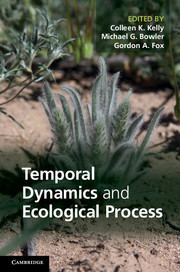Part I - Observing temporal processes in nature
Published online by Cambridge University Press: 18 December 2013
Summary
Observing temporal processes in nature
The chapters in the first section of this book are aimed at documenting the action of temporal dynamics in natural systems. We include here an assortment of life-history types as well as both experimental and observational evidence of temporal processes.
The desert annual community of the American southwest was and is a continuing resource for investigating temporal dynamics, and two of our chapters make use of it. One advantage to this community is the short generation times of the component species – up to a year aboveground, and a few years to (at most) a few decades in the seed bank. Peter Chesson is best known for his theoretical work on the ecology of diversity, in particular the mechanism known as the storage effect, dating from Chesson and Warner (1981; citation in most chapters). Here, he and his colleagues use desert annuals and clonal perennials to apply two different approaches to testing the storage hypothesis; each is drawn largely from field observations but also includes experimental elements. Larry Venable and Sarah Kimball provide an exhaustive yet concise summary of the studies carried out by the Venable group, also in the desert annual system, over a period of some 28 years. These studies are not limited to demography but include a strong ecophysiological component, which, among other things, has allowed them to extract the effects of climate change over this period.
- Type
- Chapter
- Information
- Temporal Dynamics and Ecological Process , pp. 9 - 10Publisher: Cambridge University PressPrint publication year: 2014

